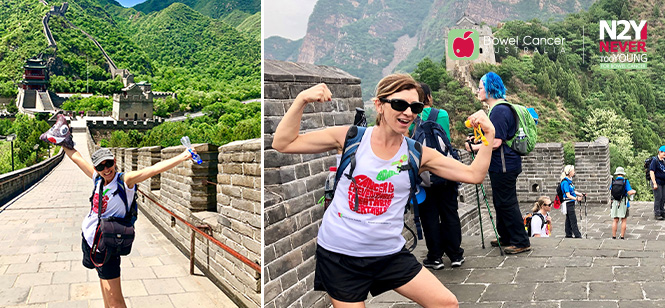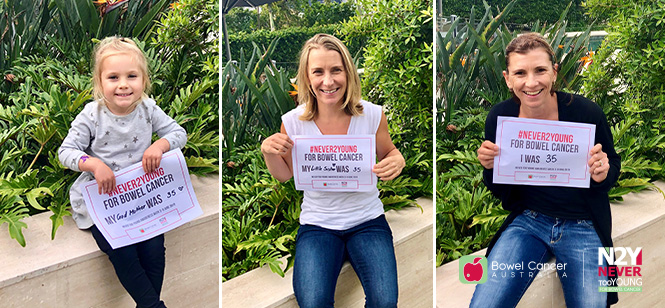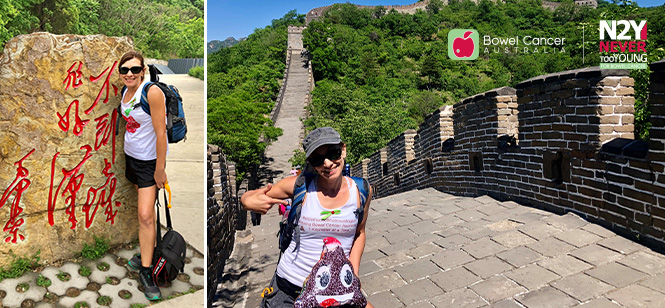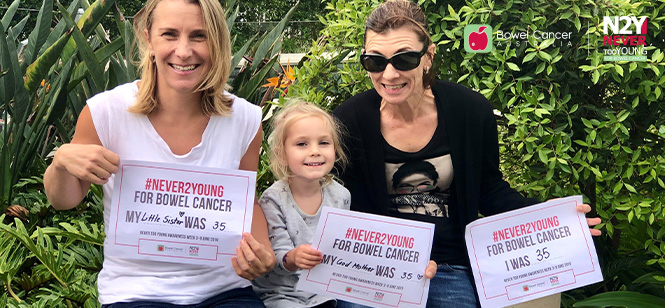Last month I participated in an Inspired Adventure called Hike for Health. My part in the adventure was choosing to trek sections of The Great Wall of China to raise awareness and funds for Bowel Cancer Australia. It also became a great motivator for me to improve my physical health and challenge myself in more ways than one.
I was lucky enough to have been able to share this experience with many like-minded and courageous souls, who have been touched personally by cancer either themselves or through loved ones. Sadly many of the stories I heard and that were shared were about bowel cancer; about several young women (and older) with advanced bowel cancer that inevitably resulted in their death(s).
The experience seemed to show me that it was time to finally share my story and lived experiences, and no longer attempt to silence the truth of the effect and impact that you really are never too young, to be diagnosed with bowel cancer. It also seems fitting Never Too Young Awareness Week coincides with it being a year since I was discharged from hospital following my life ‘saving’ (altering) surgery.

I was diagnosed with Stage 4 bowel cancer in September 2017, at the age of 35. It took around four weeks to receive this diagnosis. There is/was no family history. In hindsight it is a lot easier to be aware of the ‘potential’ signs and symptoms. At the time though, I experienced what seemed like insignificant digestive issues – bloating, cramping, minor changes in bowel habits. It wasn’t until I had weeks of persisting pain in my lower back and sacrum and significant fatigue that I realized that something was not right, not that I ever thought (nor anyone else thought) it could/would result in a cancer diagnosis.
The weeks of persisting pain and fatigue first lead me to a GP (not my usual) visit resulting in the doctor suggesting I consider commencing anti-depressant medication. I requested blood tests and left in tears. Days later the surgery contacted me to come in for another appointment. The same GP advised that my inflammatory markers were really high, as were my white cell counts, suggesting it was likely there was some infective process going on, commencing me on antibiotics, and sending me on my way, of course with no further mention of needing antidepressants...
The pain persisted and started to get worse, leaving me in tears, sleep deprived, nauseated and losing approximately 7-8kg in a matter of weeks. Despite massage, chiro and other treatment(s) and interventions, I returned to see my usual GP who had returned from holidays, who sent me for a CT scan. Still nothing, apart from evidence of constipation from all the codeine containing drugs I was taking (turned out that there was evidence of a mass, just wasn’t seen by the radiographer at the time). My urine and stool specimens were clear (including faecal occult), and blood tests still suggestive of inflammation and an infective process.
My GP changed my antibiotics, and suggested treatment for constipation. A few days later I then started to get a lot of blood/pus in my stool, which lead me to talk with GP again who decided to get some advice from a Gastroenterologist. There were suggestions of an inflammatory bowel condition, but cancer was still the furthest thing from anyone’s mind. There was then another change of antibiotics, and an urgent review with a Gastroenterologist, who suggested a colonoscopy and endoscopy. I booked in for the scopes the following week.
So I had my scope(s). I remember waking up and my husband waiting by my side, the nurse offering me a cup of tea and food (anyone who has experienced the prep knows the delight of a cup of tea (with milk) and offer of food). The Gastroenterologist then came to visit, sitting down on the edge of the bed telling us that, “we have (had) a problem”. He went on to draw a diagram on a napkin and described a ‘growth’ in my rectum that was almost causing an obstruction. He didn’t use the ‘C’ word, but rather I had to ask him to confirm that the growth was in fact (likely to be) cancer. He responded “yes”. There was a lot of shock, a lot of tears, but then also some relief that there was finally an answer to the cause of the symptoms I had been experiencing.
The too young comments commenced and continued. I was to learn in time that I wasn’t too young, as the rates of bowel cancer in under 50’s is/was significantly on the rise. But to this day the comment still has a way of pissing me off, reminding me that I’m not too young and what I have ultimately been through with this ‘$#!*y’ cancer. Also, I seem to be constantly reminded that it certainly isn’t the most pleasant or appealing of cancers either, due to its relationship to the elimination process of, you know – poo – and all…
Following my scope, I went through the difficult process of telling my family and friends. The hardest being my sister via Facetime (don’t recommend it…), my parents and a close friend who had lost her father to bowel cancer years previous. The remainder ended up being group messages to family and close friends, as I couldn’t really handle (or be distracted from) my own thoughts, feelings and emotions anymore.

I was referred to a colorectal surgeon, who confirmed that the tumour was malignant. He then referred me onto another colorectal surgeon, due to the ‘advanced’ nature of the (my) tumour. I then went for further CT, MRI and PET scans for the purposes of staging and planning. At this stage there was no evidence of metastatic disease. I was also referred to an IVF specialist, and radiation and medical oncologists. I was also started on a cocktail of drugs (narcotics and adjuvants), which finally started to get my pain under control. It’s certainly much easier to get drugs once you have a malignancy!
I declined to have any IVF treatment. And within weeks commenced chemotherapy. The worst part, besides the nausea and fatigue, was the inability to consume cold foods/drinks, and the sensation(s) at the IV site and in your peripheries (hands/fingers, feet/toes). After three cycles of chemo, and a short break over Christmas, I then commenced chemo-radiation to welcome in the New Year! Chemo-radiation was aimed at reducing the size of the tumour, and is relatively painless. But it tends to wait until the end to hit you, and hit you it does! I spent many weeks on the couch (once again), thank god for Netflix I tells ya.
I did seem to become quite accustomed to the ups and downs of cancer treatment. Just as you were starting to feel ‘good’ again, it seemed that another treatment phase was to commence and send you back to feeling pretty crap, $#!*y and sorry for yourself.
After finishing chemo-radiation I returned to see my surgeon who referred me once again to another colorectal surgeon. The man whose talent, care and attention to detail is beyond words. The most humble, caring human and surgeon you could want. Straight shooter too, honest, but incredibly caring and well, nothing short of amazing. That is something that I am and have been incredibly grateful for – the medical professionals I have had throughout my treatment(s).
So new surgeon, more scans, and essentially planning for surgery. Something I was never going to be ready for, especially listening to the details of what it would involve. But the date was scheduled, then confirmed leaving me essentially less than two weeks to deal with, sort, and see more specialists as part of the planning and preparation process. I knew or had the feeling I would ‘survive’, but it doesn’t stop you thinking about the possibility(s)…
D day rolled around quickly. The relative sense of calm, eerie. The last request/ recollection on the morning of my surgery whilst being wheeled into theatre, surrounded by a lot of people, instruments and talking to the nurse who had baked biscuits (Anzac), was to make a music request - a Pink tune. Then I was sedated, anaesthetized, comatosed and operated on to remove the (my) tumour and nearby affected tissue/structure(s). The aim of surgery and treatment was essentially for a cure, that and to achieve clear margins. To obtain this meant fairly extensive surgery. Suffice to say anyone with or in the know, of what a locally advanced and/or recurrent pelvic malignancy means, will understand what this involves.
I woke up in ICU days later, and I was not a ‘good’ patient. Likely that my nursing background both hindered and helped my (our) situation. Thankfully I had my husband and sister by my side, who were nothing short of amazing!! I trained them up well, and they learnt quickly on the job.
I spent 10 days in ICU, and a total of six weeks plus a few days in hospital. Many dark nights of the soul, post op complications, infections and pain... Although I had been advised that surgery and recovery would not be quick or easy, it’s probably a good thing I didn’t have too many expectations, as it was a f#*!ing hard slog. To walk again, to do any of the day to day things, to be a shadow of who I once was. There is still trauma in those memories, and I’d be lying if I didn’t admit that.
After I was discharged from hospital, to continue recovering at home, I was to within a few weeks to recommence chemotherapy. I was so reluctant knowing how $#!* it was going to make me feel, on top of how $#!* I was already still feeling. I returned to see my medical oncologist before recommencing chemo. My blood test results (CEA) elevated, turned out he was suspicious of liver mets. Far from my/our minds were any thoughts of metastatic disease. I went for another scan, which then confirmed a liver mass.
I was pretty spent and over it once this information was known. It was probably the biggest kick in the arse during my overall journey, especially after all that I had already seemingly sacrificed in the previous months – surgery, treatment and the like. But life seemed to change again. There was this, well f#*! it attitude. Gotta love when presented with a potentially terminal diagnosis, that the true value of life becomes apparent.
So with my newly diagnosed metastatic disease, I recommended chemo. Not just for a ‘mop-up’ of remaining cancer cells as previously planned. During cycle five of chemo I had the first of many hypersensitive reactions. Initially thinking it was a panic attack, my oncologist suggested I just have some Lorazepam, all in good humour of course. It then became apparent that it was indeed a reaction after the next two re-challenges. After the third reaction and my first personal code blue, it was decided that the Oxaliplatin component of my chemo would be discontinued. I completed the remainder of cycles with just tablets.
During this time I was also having follow-up with many of my specialists and attending day rehab most weeks. My medical oncologist referred me to another surgeon with regards to treatment for my liver met. There was also a referral to an Interventional Radiologist, whose offer of ablation (scar/destroy tissue) over resection was seriously tempting, as treatment fatigue had became very apparent. Thankfully with the advice and encouragement from my colorectal surgeon I went to see another specialist/surgeon who inevitably removed two-thirds of my liver, thanks to a rather awkwardly positioned liver met.
The hardest and most traumatic part was probably returning to the same hospital for yet another surgery. I found it hard enough to walk through the front door, or return to the radiology department for scans, let alone return to the same ICU and ward I had been on previously. Thankfully I only spent one night in ICU, followed by a week on the ward. To then return to the outside world for further recovery and what I/we refer to as ‘life rehab’.
Now a year on from my initial surgery the scars have faded, and life goes on. You adjust, you learn to cope and adapt to the new ‘you’. The physical less abled aspects subside, change, and evolve. Thankfully I slowly started to regain more of my physical strength and stamina. I still have pain, mainly neuropathic as a result of my initial surgery, but it’s mostly managed. The psychological and spiritual side of things seem to need a fair amount of ongoing ‘support’. Sometimes the hardest part is returning to a ‘normal’ life, when things are no longer ‘normal’. And trying to explain that is a really hard. Small talk just seems insignificant.
People ask if cancer has changed my outlook and perspective on life - and there’s no straight answer. It’s hard for it not to. There’s so much emotional and psychological BS to go through, that’s pretty well separate from the physical stuff. But you do what you’ve gotta do. To get through it - to ‘survive’ and eventually ‘thrive’ after cancer. And although it has been hard, really hard sometimes, I knew that I would get through it and be on the other side soon enough, even when it all seemed futile. That’s not to say that some days I’ve been incredibly curious about life and living, especially whether it would have been easier to let cancer kill me. Which makes me sad, as there are/were many beautiful souls taken too ‘soon’ by cancer and other life events. But it is/was such a reality.

Overall, my advice...
There is life after a diagnosis of cancer and more importantly, metastatic cancer.
Listen to your body - know that it does a miraculous job every minute of every day to keep you alive and living in this existence thing we call life. Love it, nurture it. Be confident and selfish in your choices and decision-making. If you think and feel there is something not right, follow your instincts until your curiosity gets the better of you and gets the answers/solutions it feels it needs and seeks.
If faced with a diagnosis of cancer or life limiting disease, find a great doctor/surgeon/specialist, who listens and explains things how you feel you need it to be heard and explained. Even if and when there are tears, ask for the facts, possibilities and realities. It’s better to have all the information you need to make a decision you feel is right for you, despite there seeming like a lot of the time the decisions are made ‘for you’. Find yourself a great psychologist/counsellor. Take care of not just the physical but the spiritual and psychological aspects of your well-being too. Go to yoga, meditation, whatever feels right for you. On the days that you really can’t be f#*!ed doing anything (people will tell you and remind you the importance of exercise, physical activity, etc.), at least try and get some sunshine, fresh air and/or be out in nature. And even then if you still can’t be f#*!ed, try not to judge yourself and/or your situation.
Also might be worth having Netflix (or the like) account, as some days, the couch will be all you can and want to do. Enjoy the simple pleasures in life – the beach, quality company, ice cream, coffee and all-day pancakes. But know time in solitude can also be therapeutic, as can journaling. And well, just do whatever makes you smile on the inside and try not to let anyone dull your sparkle. And last but not least, find your tribe and love them hard!! But don’t forget to let them love you too.
For me this is not necessarily just about a cure or treatment for cancer. It’s about raising awareness. Encouraging people to improve their health and well-being – physically, mentally and spiritually. And to inspire others to live beyond what may seem impossible. And to feel supported, without judgment.
One of my fellow hikers shared this quote and it seems worthy of being shared here as a closing statement… “Somewhere between the bottom of the climb and the summit is the answer to the mystery why we climb,” Greg Child. It’s not like I have found the answer, but it seems to me that it hasn’t just been about the climb (hike), but the journey and experience I have had and shared along the way.

